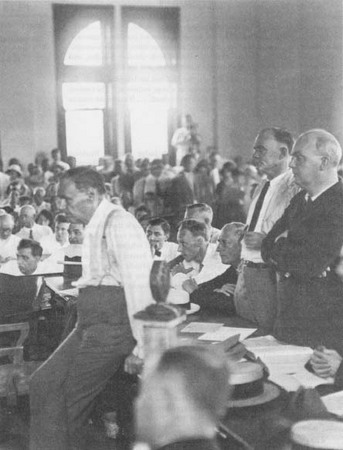John Thomas Scopes Trial: 1925 (The "Monkey Trial")
Evolution On Trial
The trial began Friday, July 10, 1925, with Judge John T. Raulston presiding. More than 900 spectators packed the sweltering courtroom. Because of an error in the original indictment, most of the first morning was spent selecting another grand jury and drawing up a new indictment. With that task done, a trial jury of 10 farmers, a schoolteacher and a clerk was quickly impaneled, and the court adjourned for the weekend.
On the first business day of the trial, the defense tried and failed to quash the indictment on grounds that the law violated both the Fourteenth Amendment to the U.S. Constitution, which states that no one may be deprived of rights without due process of law, and the freedom of religion clause of the First Amendment. Describing the Butler Act to be "as brazen and as bold an attempt to destroy learning as was ever made in the Middle Ages," Darrow predicted there would be a natural progression from the forbidding of the teaching of evolution in public schools to the banning of books and censoring of newspapers.
The opening statement for the prosecution was made the next day by A.T. Stewart, the attorney general of Tennessee, who charged Scopes with contradicting the Biblical story of Creation, thus violating the Butler Act. Responding for the defense, Dudley Malone insisted that for Scopes to be convicted the state had to prove two things: that he had denied the Biblical story of creation and that he had taught instead that man descended from a lower order of animals. Proving both would considerably complicate the prosecution's task. (While Scopes had admitted teaching evolution, there was no evidence he had denied the Bible's version of man's origins.) Malone conceded there was there were some apparent contradictions between the Darwinian and Biblical accounts of creation, but he noted that many people managed to reconcile the two theories. Only the Fundamentalists maintained that science and religion were totally incompatible on the subject.
The prosecution's case was presented briskly. The superintendent of the Rhea County school system testified that Scopes had admitted teaching evolution in a biology class. Stewart then offered a King James Version of the Bible as
 The crowded courtroom of the Scopes trial. Clarence Darrow is in the foreground.
The crowded courtroom of the Scopes trial. Clarence Darrow is in the foreground.
Scopes' students testified that he had taught that mammals had evolved from one-cell organisms and that humans share the classification "mammal" with monkeys, cats, etc. The owner of the local drugstore where Scopes had purchased the textbook he used to teach evolution acknowledged that the state had authorized sale of the textbook. Darrow and the druggist read aloud portions on Darwin. To counter, Steward read the first two chapters of the Old Testament's Genesis into the record. With that, the prosecution rested.
The next day, Thursday, July 16, the defense started calling its witnesses, beginning with a zoologist from Johns Hopkins University. The prosecution objected, arguing the evidence was inadmissible and irrelevant since the jury did not need to understand evolutionary theory to decide whether Scopes had violated the law in teaching it.
Bryan seized this opportunity to give his major speech of the trial. Clutching the offending textbook in one hand and a palm fan in the other, he belittled the theory of evolution and ridiculed a diagram in the textbook. Bryan charged that Darwinism produced agnostics and atheists, thus weakening moral standards. As evidence of this, he claimed it had inspired the German philosopher Friedrich Nietzsche, whose writings, in turn, had motivated the Chicago "thrillkillers," Nathan Leopold and Richard Loeb. Darrow, who had been the defense attorney in that case, angrily objected, stating that Bryan was misrepresenting Nietzsche's views to prejudice the jury; Judge Raulston overruled him. Bryan closed on a defiant note, assuring his audience that the Bible would survive attacks by scientists trying to reconcile it with evolution. Although some of his quips provoked appreciative laughter from spectators, observers noted that the speech lacked the eloquence and punch of Bryan's best stump performances.
Dudley Malone, presenting the defense's last argument for the admissibility of scientific evidence, charged the Fundamentalists with suppressing new ideas out of fear and claiming they had a monopoly on the truth. Malone proclaimed: "The truth always wins.… The truth does not need the forces of Government. The truth does not need Mr. Bryan. The truth is imperishable," Malone declared. "We feel we stand with progress.… We feel we stand with fundamental freedom in America. We are not afraid. Where is the fear? We defy it!" Although Malone's speech received more applause than Bryan's, it failed to persuade the judge.
The phrase "descended from a lower order of animals" was clear enough to define evolution under the law, Judge Raulston decided, ruling out the admissibility of scientific testimony.
Enraged by this decision, Arthur Hays requested the judge at least permit the expert statements to be entered into the court record, not to be heard by the jury but to be available to an appeals court. Avoiding cross-examination of its expert witnesses, the defense lawyers submitted their written statements, summaries of which went into the record.
Additional topics
- John Thomas Scopes Trial: 1925 (The "Monkey Trial") - Darrow Deflates Bryan
- John Thomas Scopes Trial: 1925 (The "Monkey Trial") - The Circus Comes To Dayton
- Other Free Encyclopedias
Law Library - American Law and Legal InformationNotable Trials and Court Cases - 1918 to 1940John Thomas Scopes Trial: 1925 (The "Monkey Trial") - The Circus Comes To Dayton, Evolution On Trial, Darrow Deflates Bryan, Suggestions For Further Reading